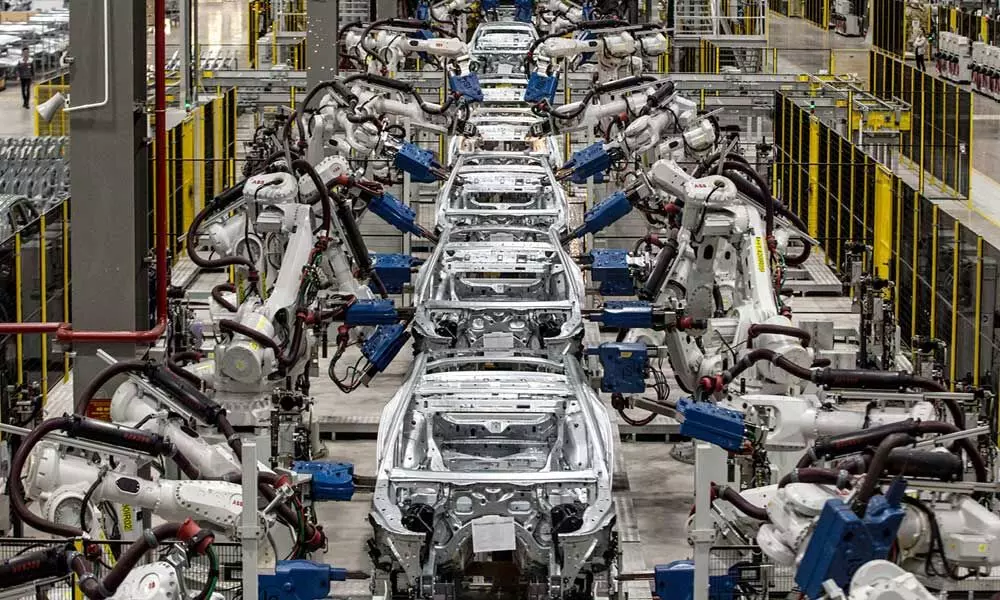Toyota breaks its just-in-time rule due to chip shortage
Meanwhile, the rest of the industry is gripped by a chip deficit. Globally, automobile production could fall by up to 3 million cars, or 3 per cent to 5 per cent of the total, this year
image for illustrative purpose

The carmaker pioneered the ultra-efficient manufacturing policy but inventories have crept up opportunely for a global semiconductor deficit
The world's largest carmaker doesn't have a chip-shortage problem. In contrast to the rest of the auto industry, Japan's Toyota Motor Corp said on Feb 10 it wasn't expecting a shortfall of semiconductors to affect its production. In the company's earnings call, Chief Financial Officer Kenta Kon said that as part of its business continuity plans, Toyota - which makes more than 10 million cars a year - had secured "one to four months of stocks as necessary" for various components. As its operating profits surged, it raised its earnings forecast by over 50 per cent. (On Tuesday, the company said it will partially halt 14 production lines at nine plants because of disruptions to suppliers resulting from the Feb 13 earthquake off the coast of Japan. The pauses range from two to four days.) Meanwhile, the rest of the industry is gripped by a chip deficit. Globally, automobile production could fall by up to 3 million cars, or 3 per cent to 5 per cent of the total, this year. It is the result of a miscalculation of demand and deep, systemic issues in the supply chain; and the scarcity isn't abating anytime soon.
Toyota's stockpile stands in contrast to its renowned production philosophy. In the 1960s and 70s, the Japanese heavyweight invented the art of just-in-time manufacturing - a strategy rooted in keeping a low stock of goods and raw materials, or inventories, on hand to cut costs and boost margins, while streamlining production. "Waste can manifest as excess inventory," the company declares on its website as it explains the roots of the Toyota Production System.
When it was implemented, the process was seen as a radical shift toward efficiency. Companies around the world took to it. American companies that adopted just-in-time manufacturing saw a 70 per cent inventory reduction along with lower labor costs and requirements for space, one study found. Lean inventories made companies more agile, especially when sales softened or the broader economy slowed. Shareholders liked that, too.
In fact, in 2017, Toyota further sharpened the process. In a trial run at a subsidiary's plant in Iwate, Japan, the company was able to cut suppliers' inventory space for some parts by 90 per cent. It effectively eliminated the need to hold extra stock, doing away with some cumbersome processes at Toyota factories.
Ironically, despite its adherence to such tight manufacturing, Toyota's inventory levels have continued to tick up over the last decade and through the global financial crisis and natural disasters in Japan and Thailand, where the company has a big presence. Its average quarterly inventory levels over the last five years have been one of the highest in the sector. The time it takes to turn the stock into sales has also gotten longer, making for efficiency losses.
Toyota has closely monitored this stockpile - especially through tough times. In the years after the global financial crisis, when automakers were slashing inventories sharply, Toyota did some soul-searching and created a system called "Rescue" that took a look deep into its tiers of suppliers. As part of this, it built a database that stores supply chain information for around 6,800 parts, giving the company a lens into where the shortages and challenges were. This tight grip on on its range of diversified suppliers helped with the current chip shortage. As Kon said during the latest earnings call, "every day, every week, every month" Toyota communicates with thousands of suppliers at all levels of the chain, giving them production volume plans frequently. An automaker needs all the parts to make a car - and, if the company is right, relationships helped it get the math right on what matters. Looking to Toyota today, car companies may discern another lesson for the future: Lean supplies may help efficiencies under normal situations but they aren't enough to weather a storm. (Bloomberg)

